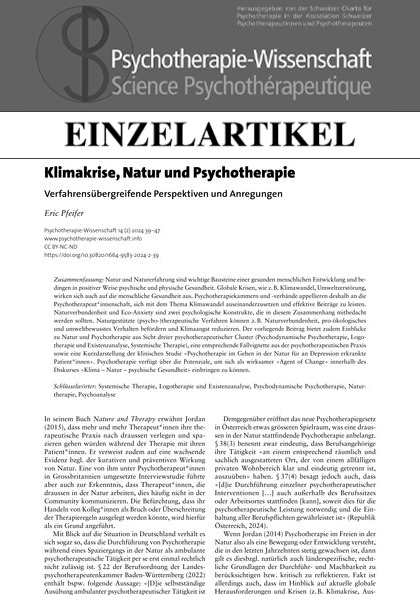Climate crisis, nature and psychotherapy
Cross-procedural perspectives and suggestions
DOI:
https://doi.org/10.30820/1664-9583-2024-2-39Keywords:
systemic therapy, logotherapy and existential analysis, psychodynamic psychotherapy, nature therapy, psychoanalysisAbstract
Nature and nature experience are crucial elements in the context of a healthy human development and have a positive impact on mental and physical health. Global crises, such as climate change and environmental destruction, also affect human health. Psychotherapy chambers and associations are therefore calling on psychotherapists to address the issue of climate change and make effective contributions. Nature connectedness and eco-anxiety are two psychological constructs that should be considered in this context. Nature-based (psycho-)therapeutic approaches can, for example, promote nature connectedness, pro-ecological and environmentally conscious behavior and reduce eco-anxiety. This article also offers insights into nature and psychotherapy from the perspective of three psychotherapeutic clusters (psychodynamic psychotherapy, logotherapy and existential analysis, systemic therapy), an appropriate case vignette taken from psychotherapeutic practice, as well as a brief description of the clinical study «Walk and talk psychotherapy for patients suffering from depression». Psychotherapy has the potential to act as an effective «agent of change» within the discourse of «climate – nature – mental health».
Downloads
How to Cite
Pfeifer, E. (2024). Climate crisis, nature and psychotherapy: Cross-procedural perspectives and suggestions. Psychotherapie-Wissenschaft, 14(2), 39–47. https://doi.org/10.30820/1664-9583-2024-2-39
Issue
Section
Original Work
License

This work is licensed under a Creative Commons Attribution-NonCommercial-NoDerivatives 3.0 Unported License.
This journal provides open access to its content in accordance with the basic premise that the free public availability of research benefits the exchange of knowledge throughout the world.
Authors wishing to publish in this journal agree to the following:
- The author/s retain/s the copyrights and consent/s to initial publication of the work in the journal under a Creative Commons Attribution licence, which allows third parties to use the work by citing the name/s of the author/s and this journal as initial publisher (in accordance with the Creative Commons Attribution-NonCommercial-NoDerivs 3.0 DE-Licence).
- The author/s can enter into additional contracts for the non-exclusive distribution (e.g. publish in a collection or book) of the version published in the journal, if the journal is cited as initial publisher.


